She used to be a singer and actress, winning international acclaim in the film The Wedding Banquet (喜宴), in which she portrayed a tough woman from China who tried marrying a gay Taiwanese man in Manhattan to get a green card. Now she is the female Atayal warrior, wearing the tradition sleeveless garments of her people, questioning Premier Yu Hsi-kun (游錫) with a stern face and powerful voice.
She is legislator May Chin (
Two weeks ago, accompanying her as she questioned Premier Yu, were a group of activists from different aboriginal tribes. Together, they sang traditional fight songs. Most of the singers likely had sung and protested in front of the Legislative Yuan many times before, but their voices were scarcely remembered.
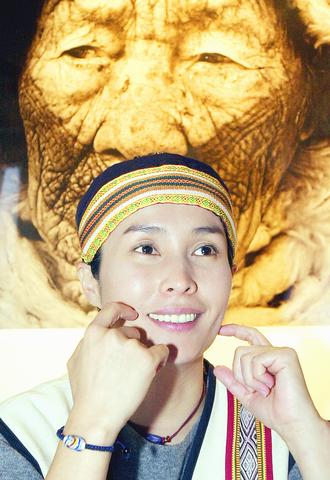
PHOTO: CHIANG YING-YING, TAIPEI TIMES
But now, with Chin singing with them, the spotlight was focused on them. And thanks to the media attention, the long-neglected nuclear waste problem on Orchid Island was finally being heard by the general public.
"It is important that the needs of Aborigines be expressed through her," said Chin Chiu-yen (
This is a role that Chin herself -- as well as her many fans -- had never imagined her playing during her 20 years as a singer and television and movie star.
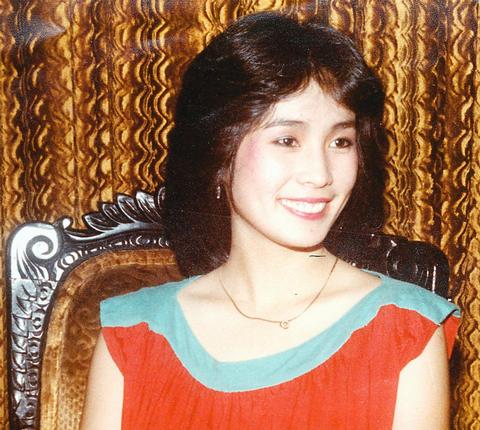
PHOTO COURTESY OF CHIN CHIU-YEN
"This was never in my career plan," Chin said. Before stepping into politics just a few months ago, she claims she did not even know the names of many government officials.
"If it wasn't that fire, which gave me the chance to take up the responsibility, if it wasn't for my liver cancer, which made me re-examine where my life belonged, I would not have become what I am now. I feel my ancestral spirit has quietly led my life in this direction," she said.
Chin's look today usually includes little or no make-up. Only in her gestures and expressions can one find her star quality.
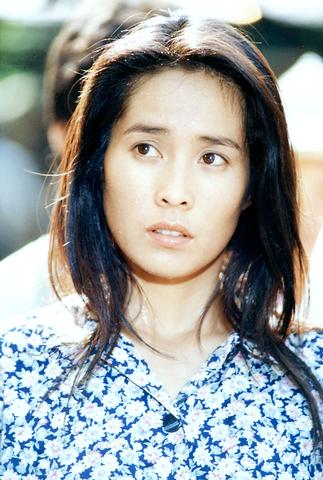
PHOTO COURTESY OF CTS
Stepping into the entertainment field at the age of 20, Chin began as a singer on variety shows. After publishing a few records, she began acting in soap operas in the 1980s. A drama called Love, in which she played a hard-working and devoted mom, made her a household name and earned her up to NT$20,000 per episode.
Chin also began a series of concerts with sexy and sensational performances, and her name became associated with many famous men, from Hong Kong stars to business tycoons. "Earnest and emotionally expressive" were the usual media comments about her.
"I was very conscientious about work. I would ask the director to shoot the scene again when I wasn't satisfied with my performance, even if the director said it was okay," Chin said. "I felt strongly about every person, every small thing that happened around me. Expressing more emotion and feeling resulted in feeling hurt afterward," she said, referring her days in show business.
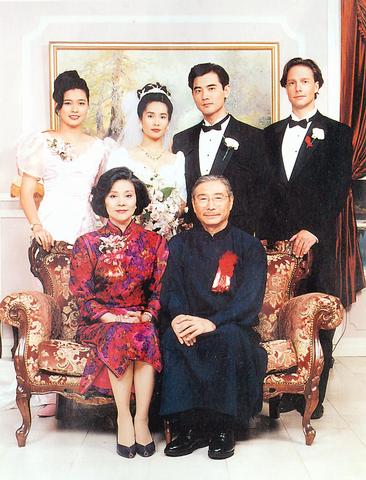
PHOTO COURTESY OF CMPC
Perhaps because of her expressiveness, she landed a role in Ang Lee's The Wedding Banquet, playing a poor artist from China jealous of her fake husband and his boyfriend. The film won the Golden Bear at the 1993 Berlin Film Festival and earned her international fame.
"In that past, I never had a strong awareness of my Atayal identity. Not many people knew of my aboriginal background," Chin recalled.
During the height of her show business career, Chin was involved in a tragic accident. Her wedding costume and style company, May-lin Weddings, at that time a luxurious, up-scale boutique, had a fire. Five people were killed and the five-story building housing the company was destroyed. She herself was injured by heavy smoke. Chin faced a lawsuit for compensating her employees who died and she was forced to give up her career as a singer and actress.
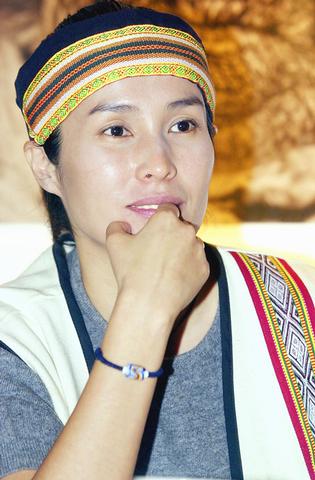
PHOTO: CHIANG YING-YING, TAIPEI TIMES
Two years later, well-known as a drinking queen who treated XO like water, Chin was diagnosed with cancer of the liver and had 8cm of her liver resected.
"After she fell ill, her strength of life became stronger. She went down to see the victims of the 921 earthquake in Taichung, near our mother's hometown," Chin's sister recalled.
The sisters are half aboriginal. Their mother is Atayal and their father comes from China. According to Chin, her aboriginal awareness began the moment before her mother passed away.
"My mom said to me `take me to my hometown' before she closed her eyes. I was shocked and had goosebumps all over my body. I'd never thought to ask where I came from, where my home was. At that time, `home' was a very vague idea," she said.
Now, of course, Chin has found her home -- her "origins," in her words -- the tribal identity of her people. After setting up the May Chin Liver Cancer Support Association, Chin became more acquainted with her aboriginal friends and neighbors. Through their persuasion, Chin decided to run for the legislature.
"She learns very fast. We could see that she cares about the issues from the bottom of her heart," said Chang Chun-chieh (
Chin's office director, Chung Chi-fe (
He told Chin to stick to the aboriginal rights platform and raise the issues to the level of people vs people (Aborigines vs Han), which they believe to be the core of Aborigines' problems.
Donning her vivid costume, Chin made an impression as a legislative freshman.
"Today I've returned to the look of my people, and I'm asking this question on their behalf for the injustice and suffering of the past 56 years...," she said as she began questioning the premier.
In private, she told her workers and assistants that having survived cancer, and now looking back, "since I've been involved with the aboriginal tribes, I feel reborn. And all my past seems vain."
The reborn Chin now has a different language and different gestures. She often uses words like "we," "our people," and "nation." She is more assertive when talking and all she wears is traditional aboriginal clothing.
In her office are big aboriginal wooden sculptures, photographs and artwork, creating the relaxed feeling of an aboriginal gallery. All her 11 staff members wear aboriginal-styled vests, both in and outside the legislature.
"I think I can be the best mouthpiece promoting aboriginal arts and culture," she said as she put on a CD of the aboriginal band The Flying Fish and Cloud Panther Music Collective (
"Monday to Friday I work here and the Legislative Yuan. On the weekends, I go around the mountains to deal with tribal problems. This is a very solid and meaningful life," she says.
The only person who's worried about her new job is Chin's sister. "She's a Virgo, type-A blood, a typical perfectionist. I always need to remind her to take a rest during her busy schedule," she said.
From a past as an artist who was all about self-expression, to a politician concerned about her nation and her people, Chin seems to have shed her past ego.
"When I speak for the people, I'm no longer me ... But when I go back to the tribes -- to my childhood village, singing with sister friends -- I'm me again. I seem to have found the things lost in my childhood," Chin said.
So, will Chin go back to show business again? "It's impossible to act, because of the condition of my health. But I will continue singing. Singing is a natural gift for me. I will probably sing more of our traditional songs, rather than pop songs," she said.
May Chin will perform at the Tungpu Fund-raising Concert, co-organized by her office, The Flying Fish and Cloud Panther Music Collective and Tungpu Culture Workshop. The concert will start at 7pm, Monday, April 22 at the National Arts Education Institute, 47 Nan-hai Rd., Taipei.

Towering high above Taiwan’s capital city at 508 meters, Taipei 101 dominates the skyline. The earthquake-proof skyscraper of steel and glass has captured the imagination of professional rock climber Alex Honnold for more than a decade. Tomorrow morning, he will climb it in his signature free solo style — without ropes or protective equipment. And Netflix will broadcast it — live. The event’s announcement has drawn both excitement and trepidation, as well as some concerns over the ethical implications of attempting such a high-risk endeavor on live broadcast. Many have questioned Honnold’s desire to continues his free-solo climbs now that he’s a

As Taiwan’s second most populous city, Taichung looms large in the electoral map. Taiwanese political commentators describe it — along with neighboring Changhua County — as Taiwan’s “swing states” (搖擺州), which is a curious direct borrowing from American election terminology. In the early post-Martial Law era, Taichung was referred to as a “desert of democracy” because while the Democratic Progressive Party (DPP) was winning elections in the north and south, Taichung remained staunchly loyal to the Chinese Nationalist Party (KMT). That changed over time, but in both Changhua and Taichung, the DPP still suffers from a “one-term curse,” with the

Jan. 26 to Feb. 1 Nearly 90 years after it was last recorded, the Basay language was taught in a classroom for the first time in September last year. Over the following three months, students learned its sounds along with the customs and folktales of the Ketagalan people, who once spoke it across northern Taiwan. Although each Ketagalan settlement had its own language, Basay functioned as a common trade language. By the late 19th century, it had largely fallen out of daily use as speakers shifted to Hoklo (commonly known as Taiwanese), surviving only in fragments remembered by the elderly. In

Lines between cop and criminal get murky in Joe Carnahan’s The Rip, a crime thriller set across one foggy Miami night, starring Matt Damon and Ben Affleck. Damon and Affleck, of course, are so closely associated with Boston — most recently they produced the 2024 heist movie The Instigators there — that a detour to South Florida puts them, a little awkwardly, in an entirely different movie landscape. This is Miami Vice territory or Elmore Leonard Land, not Southie or The Town. In The Rip, they play Miami narcotics officers who come upon a cartel stash house that Lt. Dane Dumars (Damon)